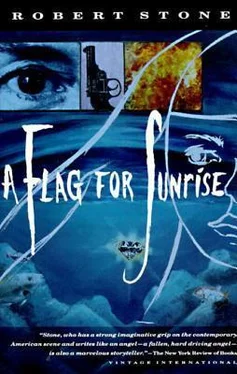Robert Stone - A Flag for Sunrise
Здесь есть возможность читать онлайн «Robert Stone - A Flag for Sunrise» весь текст электронной книги совершенно бесплатно (целиком полную версию без сокращений). В некоторых случаях можно слушать аудио, скачать через торрент в формате fb2 и присутствует краткое содержание. Год выпуска: 2012, Издательство: Vintage, Жанр: Современная проза, на английском языке. Описание произведения, (предисловие) а так же отзывы посетителей доступны на портале библиотеки ЛибКат.
- Название:A Flag for Sunrise
- Автор:
- Издательство:Vintage
- Жанр:
- Год:2012
- ISBN:нет данных
- Рейтинг книги:4 / 5. Голосов: 1
-
Избранное:Добавить в избранное
- Отзывы:
-
Ваша оценка:
- 80
- 1
- 2
- 3
- 4
- 5
A Flag for Sunrise: краткое содержание, описание и аннотация
Предлагаем к чтению аннотацию, описание, краткое содержание или предисловие (зависит от того, что написал сам автор книги «A Flag for Sunrise»). Если вы не нашли необходимую информацию о книге — напишите в комментариях, мы постараемся отыскать её.
A Flag for Sunrise — читать онлайн бесплатно полную книгу (весь текст) целиком
Ниже представлен текст книги, разбитый по страницам. Система сохранения места последней прочитанной страницы, позволяет с удобством читать онлайн бесплатно книгу «A Flag for Sunrise», без необходимости каждый раз заново искать на чём Вы остановились. Поставьте закладку, и сможете в любой момент перейти на страницу, на которой закончили чтение.
Интервал:
Закладка:
We’re getting pretty shaky, he told himself, wiping the foolish tears from his face with a Kleenex. It was being forty, marriage, soft suburban living.
She gets tougher and smarter, he thought, and I get shaky — a pattern of class and culture. Perhaps he might tell her about the country song but not about his breaking up at the wheel.
In the snowy woods beyond the paved rest area and the green garbage cans, a young black man in city clothes was carrying a paper parcel toward the road. He saw the parked Volvo with Holliwell at the wheel and turned quickly back into the maze of pines. Holliwell sighed, put the car in gear and rolled back onto the turnpike, headed for lunch and New York.
An hour later, he was crossing the Narrows bridge; the harbor and the Manhattan skyline were bright with January sunshine. Holliwell’s spirits had lifted in the wastes of Bayonne; except for a palpable desire for more alcohol, he felt that he was doing fairly well. It would be a drinking day — the morning stirrup cup had set off an old mechanism. But his habits had become so generally temperate that it seemed to him he could afford some reasonable indulgence in the field.
He took the Belt Parkway northward and fought his way into the traffic around the King’s County Courthouse. He had not been to Brooklyn for years and being there gave him the mild elation that came with a new and unfamiliar town. The restaurant was on Court Street; it had valet parking and a few sumac trees out back and he found it on the first pass. He brushed the cigarette ashes from his jacket, put his suitcase in the trunk and handed the keys to a uniformed Puerto Rican attendant.
McDermott’s was the name of the place, three huge rooms of cut glass, oak and dusty ceiling fans. McDermott’s, Holliwell decided, was great fun — and when he thought back on the business later, it seemed to him that it was largely the prospect of dining in downtown Brooklyn that had persuaded him to lunch with Marty Nolan in the first place.
A captain in a tuxedo escorted him among the seated landlords and deputy inspectors, leading him to a round table on which reposed a half-finished martini and a rumpled paisley napkin. He ordered a martini for himself and admired the huge mirrors on the paneled walls. The drink had arrived and Holliwell was taking his first sip when he saw Marty Nolan step out of the gents’ in the next salon and proceed nearsightedly across the hall.
As Marty walked, his left hand absently brushed an area below the belt of his double-knit trousers; he was checking to see if his fly was unzipped. When he saw Holliwell, his round face brightened. Holliwell stood up to shake hands with him.
“Herr Professor,” Marty Nolan said.
His hand was damp, his thick horn-rimmed glasses seemed almost about to steam and although it was not at all hot in McDermott’s there was a band of perspiration below the line of his fair curly hair.
“Good to see you, Marty,” Holliwell said.
It would be possible, he thought, to describe Nolan as fastidious — yet there was always something faintly gross about the man, the suggestion of unwholesome secrets.
Nolan raised his glass and they drank.
“I’m delighted that you made the time for lunch. I’m honored.”
“Not at all,” Holliwell said. “I looked forward to it.”
He was privy to a few of Marty Nolan’s secrets. One was that during the Tet offensive, the Viet Cong forces who overran Hue had buried him alive — and he had lain in the earth half conscious for six hours until a party of German medical missionaries dug him out.
And on one occasion, Holliwell, visiting from the Central Highlands, had found a manuscript sheet in Nolan’s portable typewriter with a single sentence at the top of the page and the sentence had read: “The Jew is at home in the modern world.” Whether or not this was a libel depended entirely upon one’s sense and experience of the modern world — but the business about “the Jew” was distinctly sinister. Can of worms there, Holliwell had thought.
But his ties to Nolan were old and strong. They had both gone to Regis in the fifties — it was a Jesuit high school that took in the smartest kids from the city’s parochial grade schools. They had both been released into the nineteen sixties from prestigious secular universities. They had both been to Vietnam on their government’s service.
Marty was peering over his glasses at the room in which they sat.
“I’m in transports of Brooklyn nostalgia,” he told Holliwell. “I come from Bay Ridge, you remember.”
“Of course I remember. What brings you up here? I thought you worked down in Washington.”
“Oh yeah,” Marty said, “in the Washington area. I’m visiting my mother.”
Holliwell inquired after Marty Nolan’s mother, wondering if he had ever married and whether or not to ask.
“Mom’s O.K. She gets around.”
“Well, it’s a great place, this,” Holliwell said. “It’s really old Brooklyn.”
They ordered more martinis, a bottle of Barbarousse. Holliwell asked for a steak and salad, Nolan the veal piccata.
“Did you know,” Nolan asked as a waiter opened the wine, “that Paul Robeson died this morning?”
“I thought he died in Russia about ten years ago.”
“This morning,” Nolan said. His eyes flashed a thick whimsy which Holliwell remembered very clearly from the past. “It was on the radio.”
“Well,” Holliwell said, cutting his steak, “I hardly know how to react.”
“I wasn’t trying to goad you to malicious satisfaction, Frank. After all, everybody dies. It just brings back old times. I’d like to go to his funeral.”
“You mean officially?”
“Don’t be ridiculous. I’d just like to go. To see it.”
“Think the FBI will be there? Taking everybody’s picture?”
“I wouldn’t think so. But who knows with those guys?”
Holliwell, chewing his steak, became aware of Marty’s eyes on him again.
“How’s your life, Frank? Quiet desperation? Self-fulfillment?”
Holliwell nodded and finished chewing.
“Last month,” he told Nolan, “my oldest daughter burned herself slightly. It was the winter solstice and she was jumping over a flaming log with her boyfriend.”
“Is that the way they get married now?”
Holliwell poured them both some Barbarousse.
“How about you, Marty? Ever get married?”
“I was married in Nam, didn’t you know that? In the Saigon cathedral.”
“It must have been after I left,” Holliwell said. “What’s the lady like?”
“Neat,” Marty said.
Holliwell found himself touched. “Is she Vietnamese?”
“From Worcester. We’re separated now. We don’t have any kids.”
Holliwell nodded to convey comprehension, sympathy, whatever might be called for.
“And you,” Nolan said. “You’re off to Compostela for a little something different.”
“I fiddled it. I invited my friends at the university down there to invite me. How did you come to hear about it?”
“I had a letter from Oscar Ocampo. He said you’d be coming down.”
Holliwell realized then that there would be a pitch. He must, he thought, have realized all along that there would be one. But it would not disturb him, he decided; it was part of a game, an artifact of his friendship with Nolan, a little fencing between gentlemen. Neither of them would take it too seriously.
“How come Oscar’s writing to you? I thought he was a leftist.”
“Sure he’s a leftist. But we’re not enemies. We have a dialogue going.”
Ocampo was a government anthropologist with a sinecure in the university at Compostela, a gambler and a great womanizer. Holliwell had always known him to be a passionate sympathizer with revolution.
Читать дальшеИнтервал:
Закладка:
Похожие книги на «A Flag for Sunrise»
Представляем Вашему вниманию похожие книги на «A Flag for Sunrise» списком для выбора. Мы отобрали схожую по названию и смыслу литературу в надежде предоставить читателям больше вариантов отыскать новые, интересные, ещё непрочитанные произведения.
Обсуждение, отзывы о книге «A Flag for Sunrise» и просто собственные мнения читателей. Оставьте ваши комментарии, напишите, что Вы думаете о произведении, его смысле или главных героях. Укажите что конкретно понравилось, а что нет, и почему Вы так считаете.












